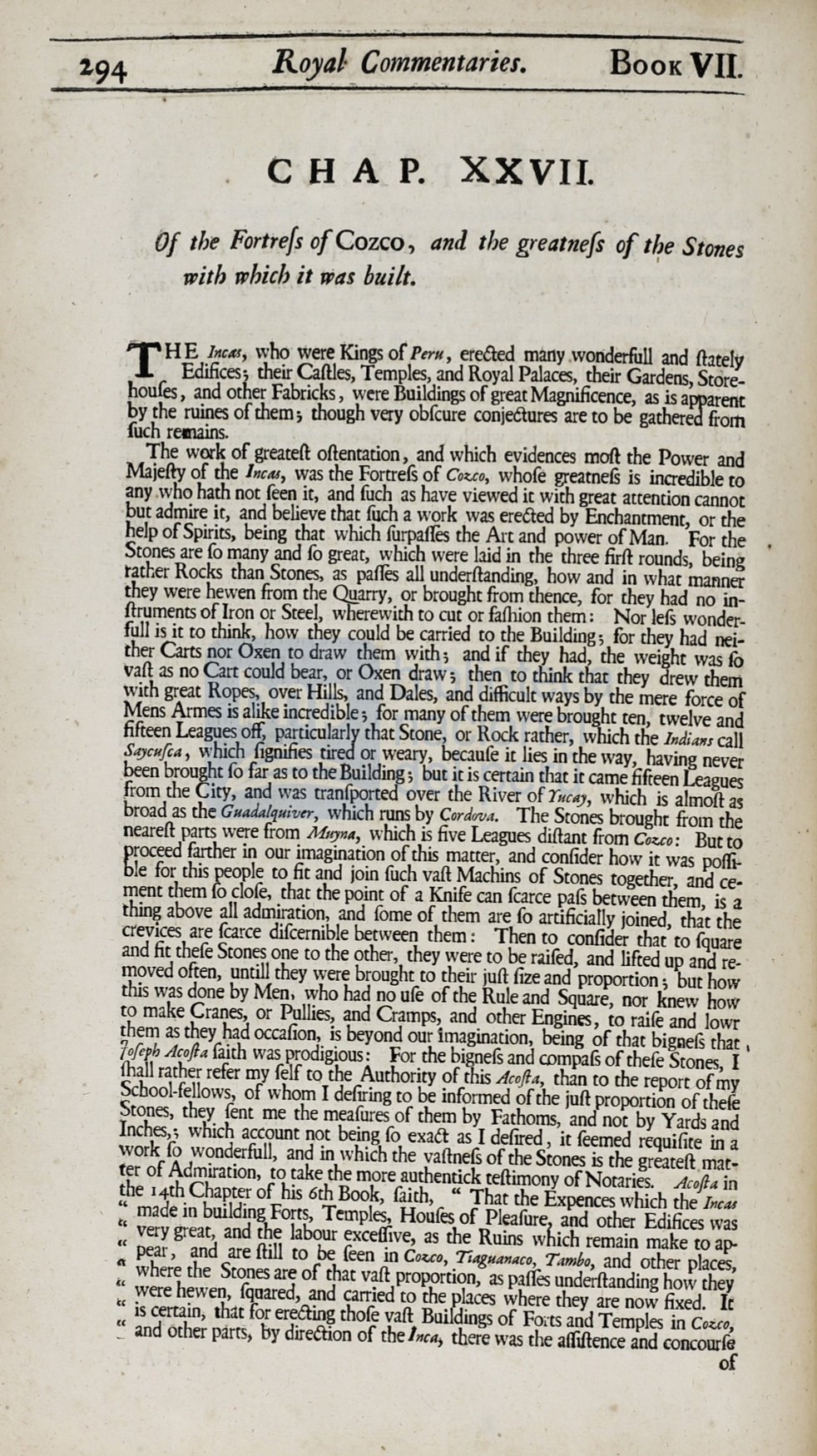

2-94
BooK
VII.
C H A_P. XXVII.
IJJ
the
Fortrefs of
Cozco,
and the greatnefs
of
t~e
Stones
with which it
was
huilt.
T
HE
Jnc,t,f,
who·were iGngs oí
Peru,
eteél:ed many .wori~erfüll and lb.t_ely
_
Edifices• their Cafiles, Temples, and Royal Palaces, their Gardens, Store–
houfes , and other Fabricks , were Buildings of g~eat Magnificence, as
is
apparent
by
the ruines ofthem ; though very obfcure con¡eétures are to be gathered from
fuch remains.
,,,
.
The work of greatefr oíl:encation, ana which evidences moft the Power and
Majefty of the
lnca1,
was the Fortrefs of
Couo,
whofe greatnefs is incredible to
any .who hath not feen ic, and füch as h~ve viewed it wich greac atcencion cannot
but admire ic, and believe that füch a work was ereéted by Enchantmenc, or che
help ofSpirits, being that which furpaffes che Are and power ofMan. For che
,
Stones are
fo
many and fo greac, which were laid in che three firft rounds, being
tather Rocks than Stones, as paífes all underíl:anding, how and in what marmer
they were hewen from che Qg_arry, or brought from thence, for chey had no
in–
firuments of Iron or Sceel, wherewith to cut or faíhion them: Nor lefs wonder–
full is it to think, how they could be carried to che Building ; for chey had nei–
ther Carts nor Oxeo to draw them with; and if they had, the weight was
fo
\raíl: as no Cart could bear, or Oxeo draw; then to think that they drew them
wich great Ropes, over Hills, and Dales, and difficult ways by che mere force of
Mens Armes is alike incredible; for many of them were brought ten, twelve and
fifteen Leagues off, particularly that Stone, or Rock rather, which che
India1ts
call
S,rycufca,
which fignifies tired or weary, becaufe it lies in the way, having never
heen brought fo far as to che Building; but it is certain chat it carne fifreen I:eagues
from che City, and was tranfported over the River of
YucaJ,
which is almoíl: as
bro~d as the
Guada!quiver,
which runs by
Cordova.
The Scones brought from the
neareíl: pares were from
Muyna,
which
is
five Leagues diflant from
Couo:
Bue to
proceed farcher in our imagination ofthis matter, and conGder how it was poíf1-
ble for this people to
fit
and join füch vaíl: Machins of Stones together, and ce–
ment chem
fo
clofe, chac the point of a Knife can [caree pafs between them, is
a
thing above all admiration, and fome of them are
fo
artificia!ly joined, that the
crevices are
[caree
difcernible becween them : Then to confider that
to
fquare
and
fit
thefe Stones one to che other, they were to be raifed, and lifced up ano re–
moved often, unti!l they were brought to cheir juft fize and proportion
~
bue how
this was done by Men, who had no ufe of the Rule and Square, nor knew how
to ma~e Granes, or Pullies, and Cramps, and ocher Engines, to raife and lowr
them as they had occaGon, is beyond our imaginacion, being of that bigneís that ,
'fofeph Acofta
faith was prodigious: For the bignefs and compafs of thefe Scones, I
íhall racher refer my felf tQ the Auchority of this
Acofta,
than to the report ofmy
School-fellows, of whom I defüing to be informed ofthe juíl: proportion of theíe
Stones, they fent me the meafures of them by Fathoms, and not by Yards and
loches,; which account not being fo exaét as I defüed , it feemed requifite in a
work fo wonderfull, and in which che vaíl:nefs of the Stones
is
the greaceíl: mat·
tfr of Admiration, to take the more authentick tefümony ofNotaries.
Acofta
in
the 14ch Chapter of his 6th Book, faith,
" That che Expences which the
Inca,
, " _made in building Forts, Temples, Houfes of Pleafure
1
and other Edifices was
t,
very great, and the labour exceffive, as the Ruins which remain make co ap-
- " pear, and are füll to
be
feen in
Couo, Tiaguan11co, Tamho,
and other places,
~
where che Stones are of that vaíl: proporcion, as paífes underíl:anding how chey
" were hewen, fqDared, and carried to che places where they are now fixed.
le
t,
is cercain; thát for ereéting chofe vaíl: Buildings of Fmts and Temples in
Cotco,
~
and ocher párts; by direétion of tbe
Inca;
there was the affúlence and eoncourfo
of














